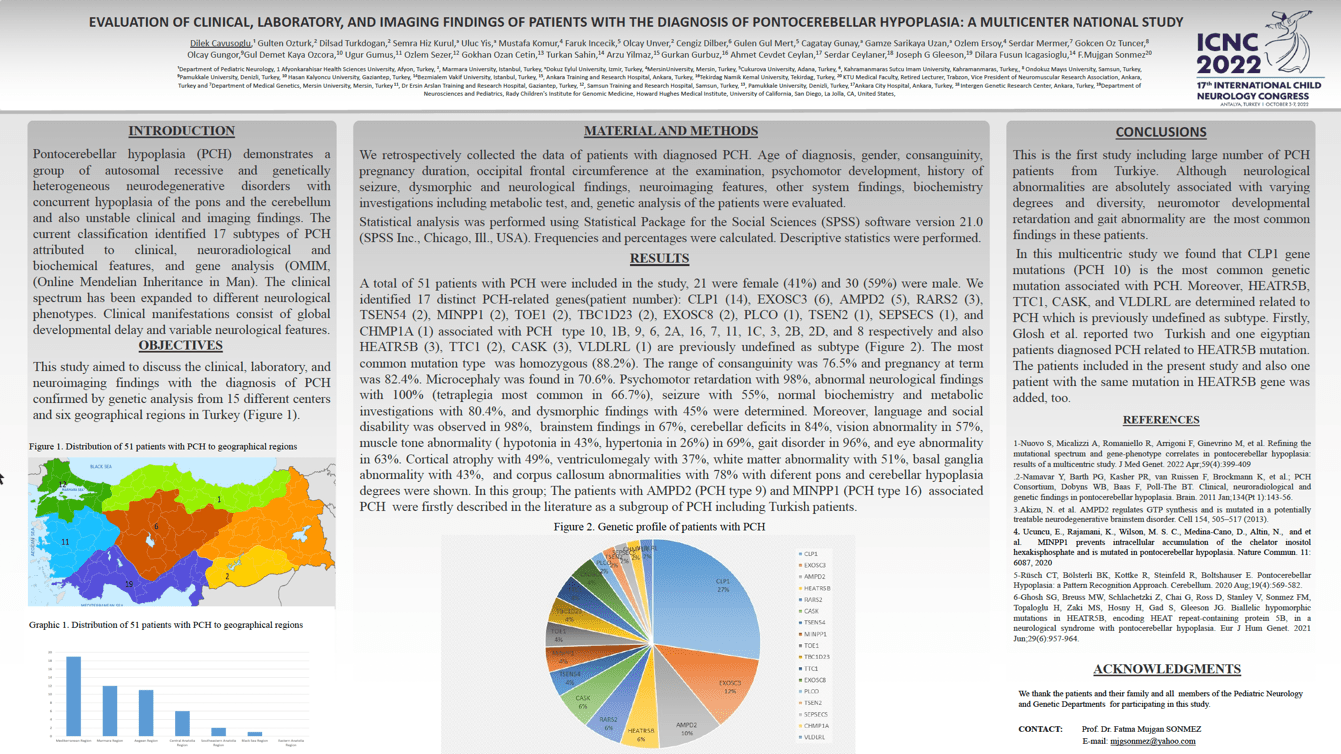Evaluation of clinical, laboratory, and imaging findings of patients with the diagnosis of Pontocerebellar Hypoplasia: A multicenter national study
Dilek Cavusoglu, Gulten Ozturk, Dilsad Turkdogan, Semra Hiz Kurul, Uluc Yis, Mustafa Komur, Faruk Incecik, Olcay Unver, Cengiz Dilber, Gulen Gul Mert, Cagatay Gunay, Gamze Sarikaya Uzan, Ozlem Ersoy, Serdar Mermer, Gokcen Oz Tuncer, Olcay Gungor, Gul Demet Kaya Ozcora, Ugur Gumus, Ozlem Sezer, Gokhan Ozan Cetin, Turkan Sahin, Arzu Yilmaz, Gurkan Gurbuz, Ahmet Cevdet Ceylan, Serdar Ceylaner, Joseph G Gleeson, Dilara Fusun Icagasioglu, F. Mujgan Sonmez
Objectives: Pontocerebellar hypoplasia (PCH) describes a rare, heterogeneous group of neurodegenerative/neurodevelopmental disorders mainly with severe hypoplasia or atrophy of cerebellum and pons, and also variable involvement of supratentorial structures. This study aimed to discuss the clinical, laboratory, and neuroimaging findings with the diagnosis of PCH confirmed by genetic analysis from 15 different centers in Turkey. Methods: We retrospectively collected the data of PCH patients. Age of diagnosis, gender, consanguinity, pregnancy duration, occipital frontal circumference at the examination, psychomotor development, seizure, neurological findings, neuroimaging features, other system findings, biochemistry tests, metabolic investigations, dysmorphic findings, and, genetic analysis of the patients was evaluated. Results: A total of 51 patients with PCH were included in the study, 21 were female (41%) and 30 (59%) were male. We identified 17 distinct PCH-related genes: CLP1 (14), EXOSC3 (6), AMPD2 (5), HEATR5B (3), RARS2 (3), CASK (3), TSEN54 (2), MINPP1 (2), TOE1 (2), TBC1D23 (2), TTC1 (2), EXOSC8 (2), PLCO (1), TSEN2 (1), SEPSECS (1), CHMP1A (1), and VLDLRL (1). The most common mutation was homozygous (88.2%). The range of consanguinity was 76.5% and pregnancy at term was 82.4%. Microcephaly was found in 70.6%. Psychomotor retardation with 98%, abnormal neurological findings with 100% (tetraplegia most common in 66.7%), seizure with 55%, normal biochemistry and metabolic investigations with 80.4%, and dysmorphic findings with 45% were determined. Conclusion: Although clinical manifestation is variable and etiology is heterogeneous in PCH, the diagnosis of PCH is substantial for offering suitable prenatal genetic testing
Keywords: Pontocerebellar hypoplasia, psychomotor retardation, microcephaly.
Dilek Cavusoglu
Turkey
Gulten Ozturk
Marmara University School of Medicine
Turkey
Dilsad Turkdogan
Marmara University School of Medicine
Turkey
Semra Hiz Kurul
Dokuz Eylul University
Turkey
Uluc Yis
Dokuz Eylul University
Turkey
Mustafa Komur
Mersin University Faculty of Medicine
Turkey
Faruk Incecik
Cukurova University Faculty of Medicine
Turkey
Olcay Unver
Marmara University School of Medicine
Turkey
Cengiz Dilber
Kahramanmaras Sutcu Imam University
Turkey
Objectives: Pontocerebellar hypoplasia (PCH) describes a rare, heterogeneous group of neurodegenerative/neurodevelopmental disorders mainly with severe hypoplasia or atrophy of cerebellum and pons, and also variable involvement of supratentorial structures. This study aimed to discuss the clinical, laboratory, and neuroimaging findings with the diagnosis of PCH confirmed by genetic analysis from 15 different centers in Turkey. Methods: We retrospectively collected the data of PCH patients. Age of diagnosis, gender, consanguinity, pregnancy duration, occipital frontal circumference at the examination, psychomotor development, seizure, neurological findings, neuroimaging features, other system findings, biochemistry tests, metabolic investigations, dysmorphic findings, and, genetic analysis of the patients was evaluated. Results: A total of 51 patients with PCH were included in the study, 21 were female (41%) and 30 (59%) were male. We identified 17 distinct PCH-related genes: CLP1 (14), EXOSC3 (6), AMPD2 (5), HEATR5B (3), RARS2 (3), CASK (3), TSEN54 (2), MINPP1 (2), TOE1 (2), TBC1D23 (2), TTC1 (2), EXOSC8 (2), PLCO (1), TSEN2 (1), SEPSECS (1), CHMP1A (1), and VLDLRL (1). The most common mutation was homozygous (88.2%). The range of consanguinity was 76.5% and pregnancy at term was 82.4%. Microcephaly was found in 70.6%. Psychomotor retardation with 98%, abnormal neurological findings with 100% (tetraplegia most common in 66.7%), seizure with 55%, normal biochemistry and metabolic investigations with 80.4%, and dysmorphic findings with 45% were determined. Conclusion: Although clinical manifestation is variable and etiology is heterogeneous in PCH, the diagnosis of PCH is substantial for offering suitable prenatal genetic testing
Keywords: Pontocerebellar hypoplasia, psychomotor retardation, microcephaly.
Dilek Cavusoglu
Turkey
Gulten Ozturk
Marmara University School of Medicine
Turkey
Dilsad Turkdogan
Marmara University School of Medicine
Turkey
Semra Hiz Kurul
Dokuz Eylul University
Turkey
Uluc Yis
Dokuz Eylul University
Turkey
Mustafa Komur
Mersin University Faculty of Medicine
Turkey
Faruk Incecik
Cukurova University Faculty of Medicine
Turkey
Olcay Unver
Marmara University School of Medicine
Turkey
Cengiz Dilber
Kahramanmaras Sutcu Imam University
Turkey

Dilek Cavusoglu
Turkey
Turkey